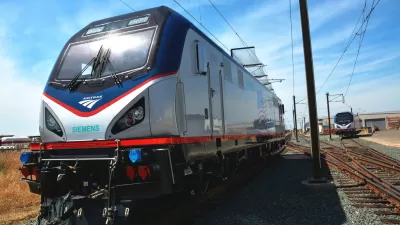Two weeks after Congress passed HR 2095, Bush signed this bill to double Amtrak funding and mandate safety technology to prevent Metrolink-like crashes. It may be a precursor to greatly expanded transit spending in the next administration.
"President Bush today signed into law a bill to provide billions of dollars to boost passenger rail safety and strengthen Amtrak, including upgrades to the Northeast Corridor.
The legislation, pushed by New Jersey Democratic Sen. Frank Lautenberg, would allocate $1.6 billion for rail safety, and renew and expand the Federal Railroad Administration.
Additionally, the bill contains a provision pushed by Republicans to open up the Northeast Corridor to private competition. Specifically, the measure would allow the transportation secretary to invite bids from private companies to build new high-speed rail tracks alongside existing ones in the Northeast and other well-traveled corridors."
from wsj:
"The legislation provides roughly $13 billion for Amtrak and passenger-rail funding over five years, nearly double current spending levels.
The shift to rail and away from cars -- Americans have been driving less for nearly a year now -- will also affect next year's debate on a transportation-spending bill that could cost as much as $500 billion. Currently, the federal government spends more than $40 billion annually on highways, roughly $10 billion on mass transit and about $1.4 billion on Amtrak.
Going forward, debate will also focus on whether to allocate federal dollars differently. Several Democratic leaders who will play key roles in the coming transportation debate say concerns over congestion, pollution and oil consumption should lead to greater spending on passenger-rail service."
Thanks to MTC-ABAG Library
FULL STORY: Bush signs rail bill

Planetizen Federal Action Tracker
A weekly monitor of how Trump’s orders and actions are impacting planners and planning in America.

Maui's Vacation Rental Debate Turns Ugly
Verbal attacks, misinformation campaigns and fistfights plague a high-stakes debate to convert thousands of vacation rentals into long-term housing.

Restaurant Patios Were a Pandemic Win — Why Were They so Hard to Keep?
Social distancing requirements and changes in travel patterns prompted cities to pilot new uses for street and sidewalk space. Then it got complicated.

In California Battle of Housing vs. Environment, Housing Just Won
A new state law significantly limits the power of CEQA, an environmental review law that served as a powerful tool for blocking new development.

Boulder Eliminates Parking Minimums Citywide
Officials estimate the cost of building a single underground parking space at up to $100,000.

Orange County, Florida Adopts Largest US “Sprawl Repair” Code
The ‘Orange Code’ seeks to rectify decades of sprawl-inducing, car-oriented development.
Urban Design for Planners 1: Software Tools
This six-course series explores essential urban design concepts using open source software and equips planners with the tools they need to participate fully in the urban design process.
Planning for Universal Design
Learn the tools for implementing Universal Design in planning regulations.
Heyer Gruel & Associates PA
JM Goldson LLC
Custer County Colorado
City of Camden Redevelopment Agency
City of Astoria
Transportation Research & Education Center (TREC) at Portland State University
Jefferson Parish Government
Camden Redevelopment Agency
City of Claremont




























